I think I just found the best budget frame in 2024—the AxisFlying Manta 5 SE! This freestyle FPV frame kit combines performance, affordability, and simplicity. By blending CNC aluminium parts with high-quality carbon fiber and practical 3D-printed accessories, the Manta5 SE is designed to deliver value and versatility for FPV drone builders. In this review, we’ll dive into the design, features, and how it stacks up against the popular TBS Source One V5.

New to FPV, learn about the basics of FPV drone frames in this tutorial: https://oscarliang.com/fpv-drone-frames/
Where to Buy
You can purchase the Manta 5 SE frame kit from these vendors:
The packaging is impressive for a budget frame, rivalling or even surpassing frames that cost twice as much. The attention to detail sets the Manta 5 SE apart from its competitors.
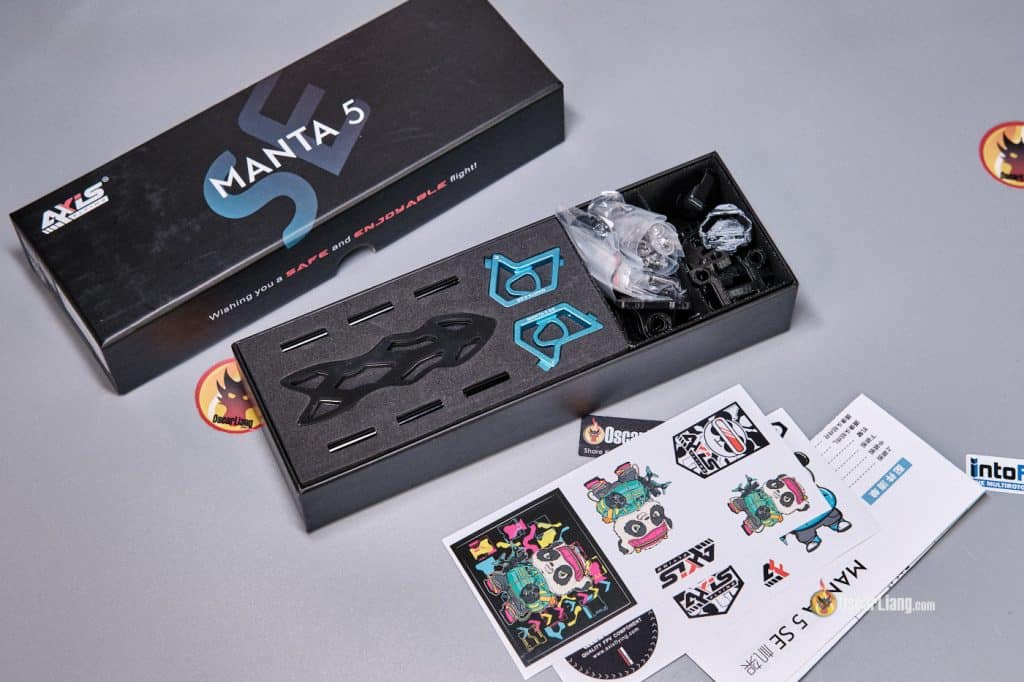
One of the biggest selling points for me is the inclusion of 3D printed TPU parts such as the GoPro mount, VTX/receiver antenna mount, GPS holder, and arm guards. It even comes with a mini beeper, which is cleverly integrated into the frame design.
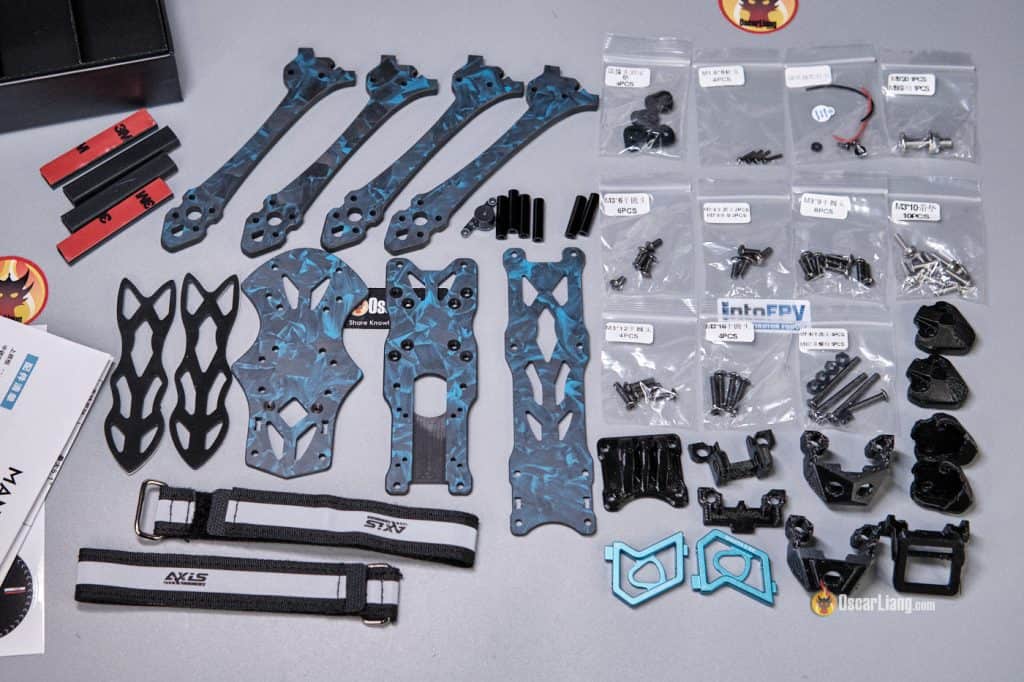
Specifications
- Wheelbase: 223mm (diagonal motor-to-motor distance)
- Propeller Size: Supports up to 5.1-inch props
- Bottom Plates: Split design
- FPV Camera Compatibility: Micro FPV camera (19mm width) and DJI O3 camera (20mm width)
- FC/ESC Stack Mounting: 20x20mm (M3) and 30.5×30.5mm (M3)
- VTX Mounting: 20x20mm (M2) and 25.5×25.5mm (M2)
- Motor Mount: 16x16mm (M3)
- Stack height (standoff): 20mm
- Material: T700 Carbon Fiber and Aluminum
- Lipo battery pad, strap, and stack screws included
Carbon Fiber Thickness:
- Arms: 5.5mm
- Top Plate: 2mm
- Middle Plate: 3mm
- Bottom Plate: 3mm
- Camera Plate: 2mm
Weight:
- 130g (without TPU parts)
- 157g (with TPU parts)
Better Than Source One?
It’s been over two years since the release of the TBS Source One V5, and it had undoubtedly been one of the best budget 5-inch FPV drone frames. While many challengers have emerged, none have matched its affordability and user experience—until now, with the AxisFlying Manta 5 SE.
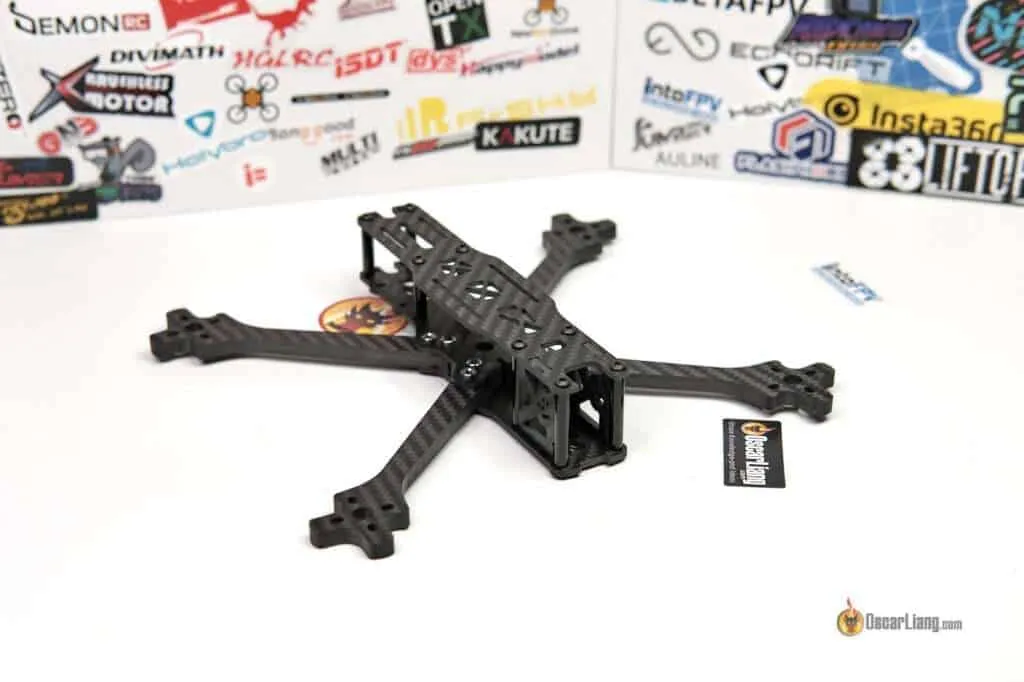
Source One’s Stagnant Development
Although the Source One is an open-source project, this comes with inherent drawbacks. For instance, there hasn’t been any update on the frame in the past couple of years. Many in the FPV community, including myself, have been eagerly waiting for a new version with native DJI O3 support for a long time, and now even the DJI O4 is on the horizon, hope is fading. There are custom made TPU parts you can add to the Source One to make it compatible with the O3, but not everyone has a 3D printer and it’s a hassle. The open-source nature means development is driven mostly by community passion rather than profit, which unfortunately means unpredictable outcome.
Manta 5 SE vs. Source One V5
The TBS Source One V5 is still the cheapest brand name frame on the market, priced at $29.99. However, the AxisFlying Manta 5 SE, priced at $39.99, offers significantly more features that, in my opinion, make it well worth the extra $10.
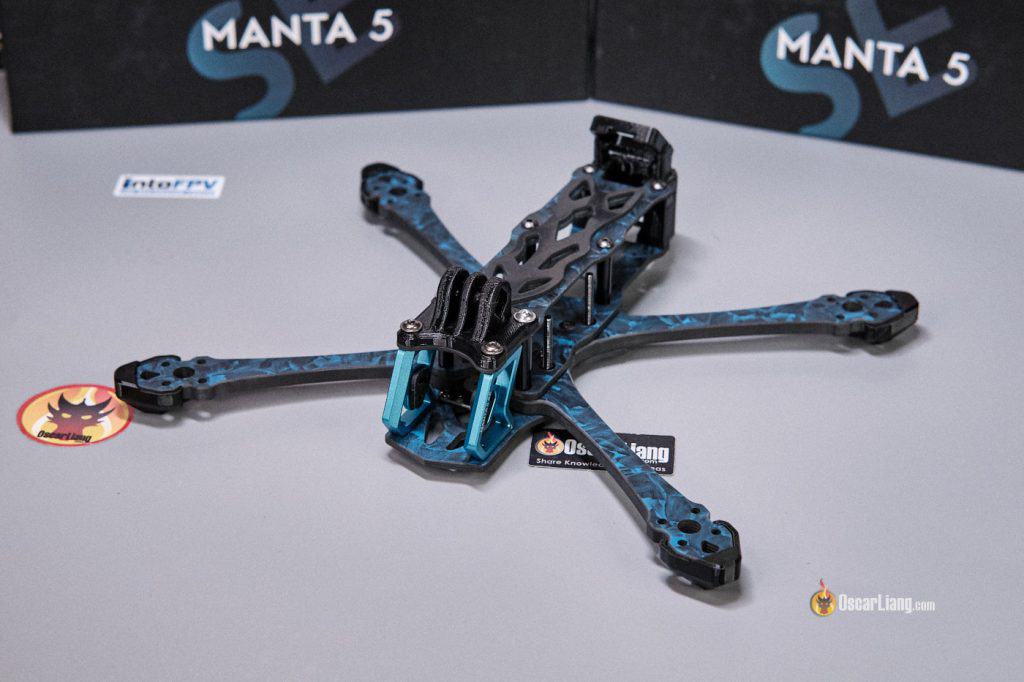
Why the Manta 5 SE is Better, to sum it up:
- Native DJI O3 Support: No need for modifications or extra parts—the Manta 5 SE supports the DJI O3 system right out of the box.
- 3D Printed TPU Parts Included: The kit comes with arm guards, VTX and receiver antenna mounts, and a GPS holder—no need to source or print these separately.
- Integrated Buzzer: Comes with a small buzzer, which is a handy addition for locating your drone after a crash.
- Beautiful Carbon Fiber Finish: The carbon fiber is beautifully crafted, with chamfered edges requiring no additional sanding or preparation.
- Complete Hardware Kit: Includes long stack screws, motor screws, and battery straps—items missing in the Source One kit.
- User Friendly VTX Mounting: Supports both 20x20mm and 25.5×25.5mm mounts with M2 holes, offering greater compatibility for modern VTX systems.
- Simpler Assembly: Slightly easier to build, with assembly instructions included (a thoughtful touch absent in the Source One kit).
- Premium Packaging: Comes in secure and professional packaging, ensuring all parts arrive in perfect condition.
Advantages of the Source One V5:
- More 3D Printed Accessory Designs Available: Thanks to its open-source nature and large user base, there’s a wide range of free 3D-printed accessory designs available online—but you’ll need access to a 3D printer to use them.
- Open Source Flexibility: You can cut your own replacement parts (i.e. arms and plates) if you have access to CNC equipment.
- Spare Parts Availability: Spare arms and plates are available to purchase.
Parts Quality
Despite the low price, AxisFlying didn’t cut corners with the Manta 5 SE frame design. Its stunning aesthetic, featuring blue aluminium accents and carbon plates with a unique blue pattern, makes it a visually striking addition to any build.
The surface of the carbon plates has a fine sprayed “blue marble” finish, adding a touch of sophistication. All arms and plates have chamfered edges, providing a smooth and premium feel while eliminating sharp edges.
The bottom plate incorporates black threaded inserts (press nuts), which not only make assembly easy, but also maintain a clean and professional look.
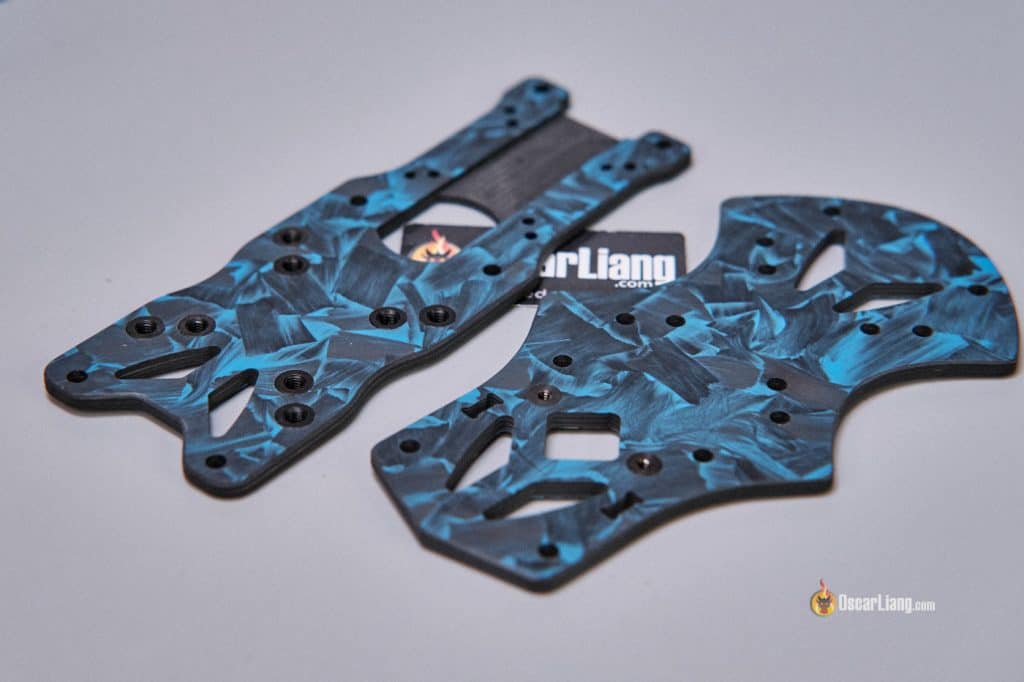
I also appreciate the identical arm design, which makes building straightforward and reduces confusion during the assembly/repair process.
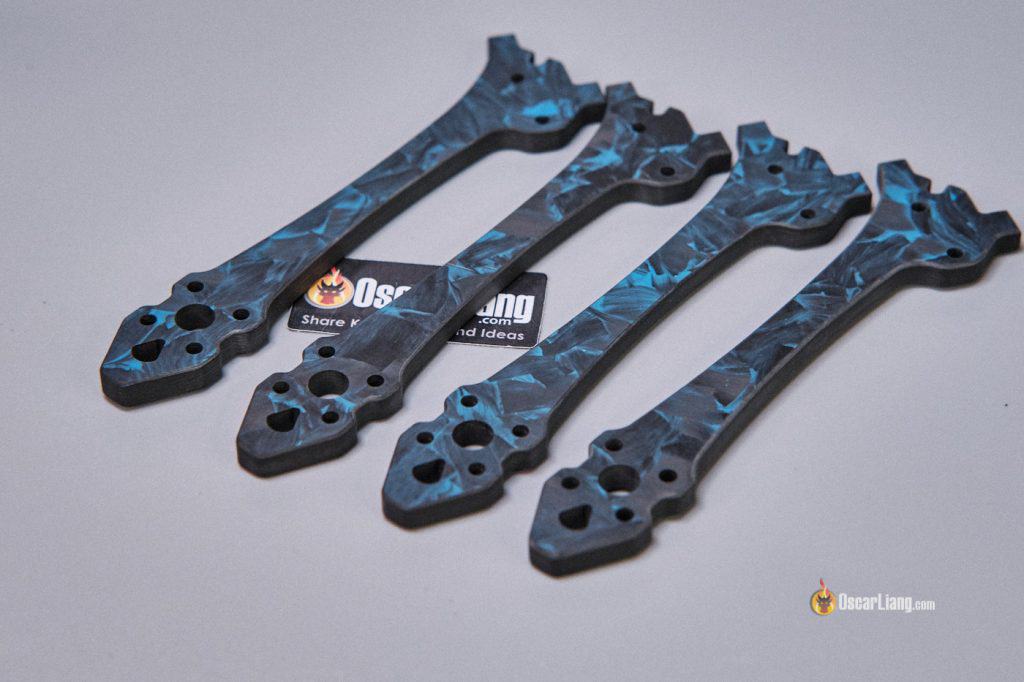
Design
The AxisFlying Manta 5 SE adopts a similar “split deck” design to the Source One V5, where the arms are sandwiched between two plates. In a split deck design, the bottom plates only overlap in the center, it reduces weight while allowing for more room in the front, providing extra space for mounting the FPV camera. To accommodate for the extra height in the front, the Manta uses custom made CNC aluminum plates, which are more expensive to manufacture but avoids using longer standoffs. In contrast, the Source One V5 relies on an old fashion solution – carbon fiber plates for mounting the FPV camera, and requiring two different standoff sizes which I always find slightly annoying.
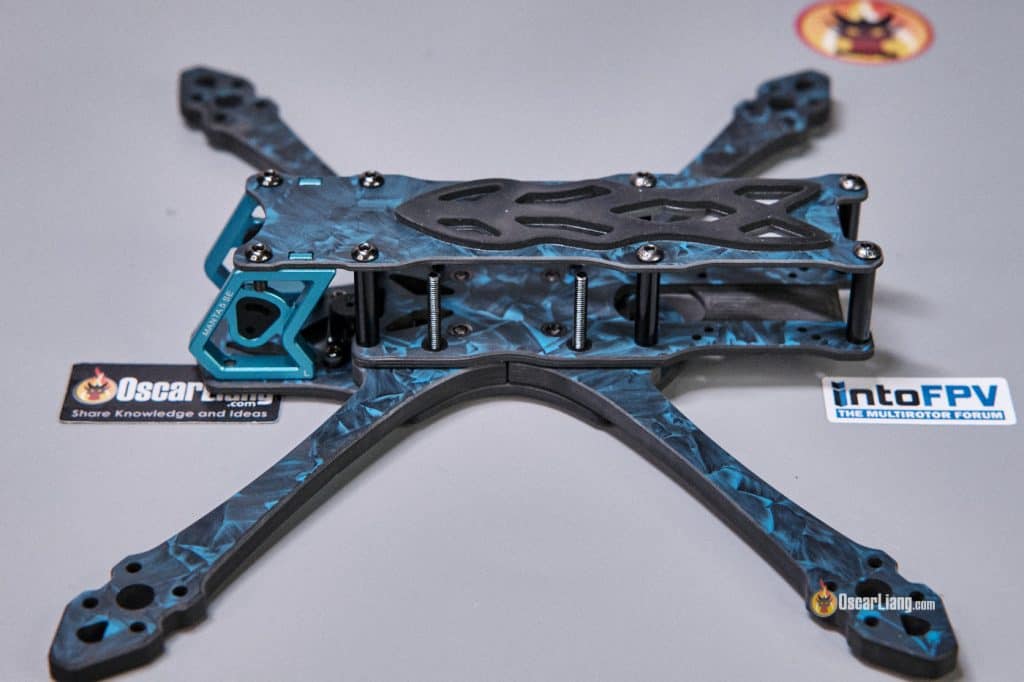
The camera cage on the Manta is approximately 23.5mm wide. With the appropriate rubber inserts, you can install FPV cameras of either 19mm or 20mm width, including standard micro cameras and the DJI O3.
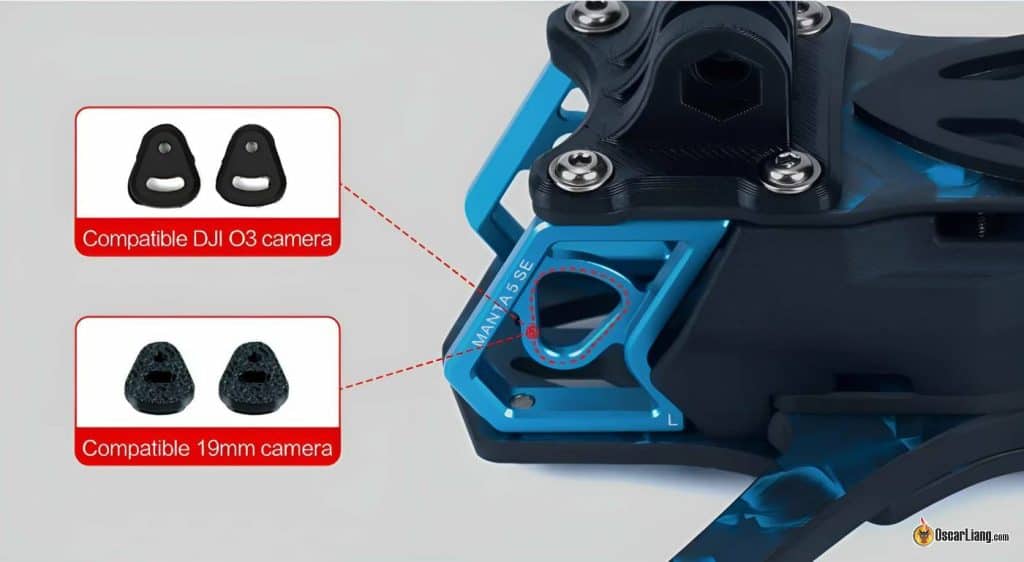
However, while the arms are slightly more stretched out than the Source One, the camera cage is positioned slightly further back. This could increase the likelihood of propellers appearing in the camera’s view if your camera angle is low, particularly with wide FOV cameras like the DJI O3.
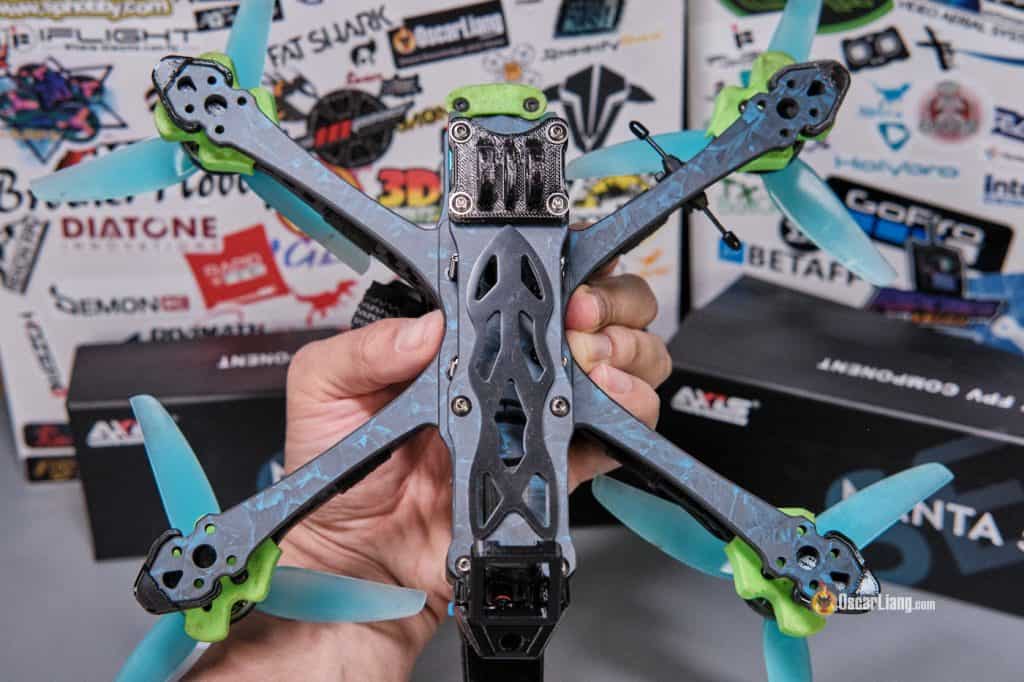
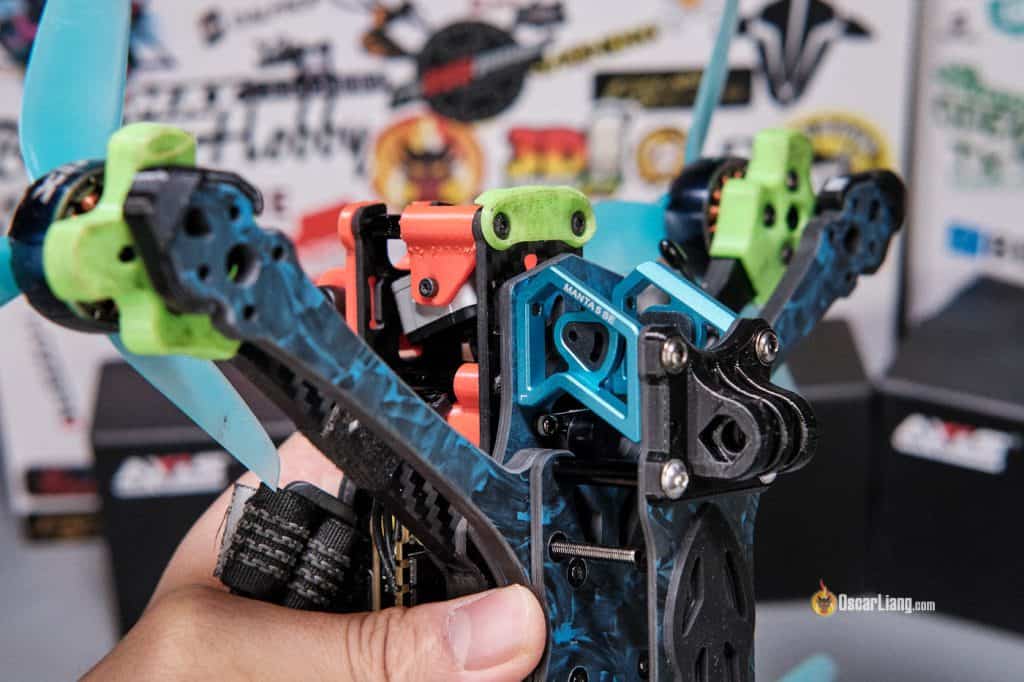
FC/VTX Mounting Options
In the middle of the frame, both the Manta 5 SE and Source One V5 support 20x20mm and 30.5×30.5mm FC stacks with M3 bolts. Neither frame natively supports 25.5×25.5mm AIO boards, but this can be resolved with 3D-printed adapters.
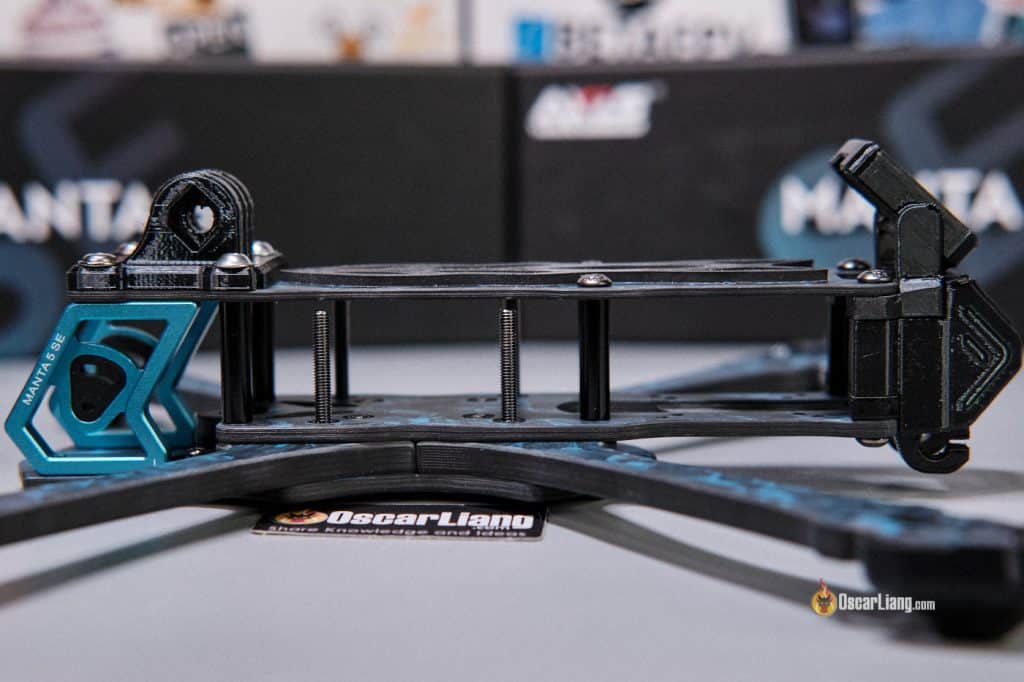
At the rear, the Manta offers both 20x20mm and 25.5×25.5mm mounting options for your VTX, whereas the Source One only provides 20x20mm mounting. The Manta uses M2 holes for VTX mounting, while the Source One uses M3 holes. This makes the Manta more compatible with most VTX systems, which are typically designed for M2 hardware.
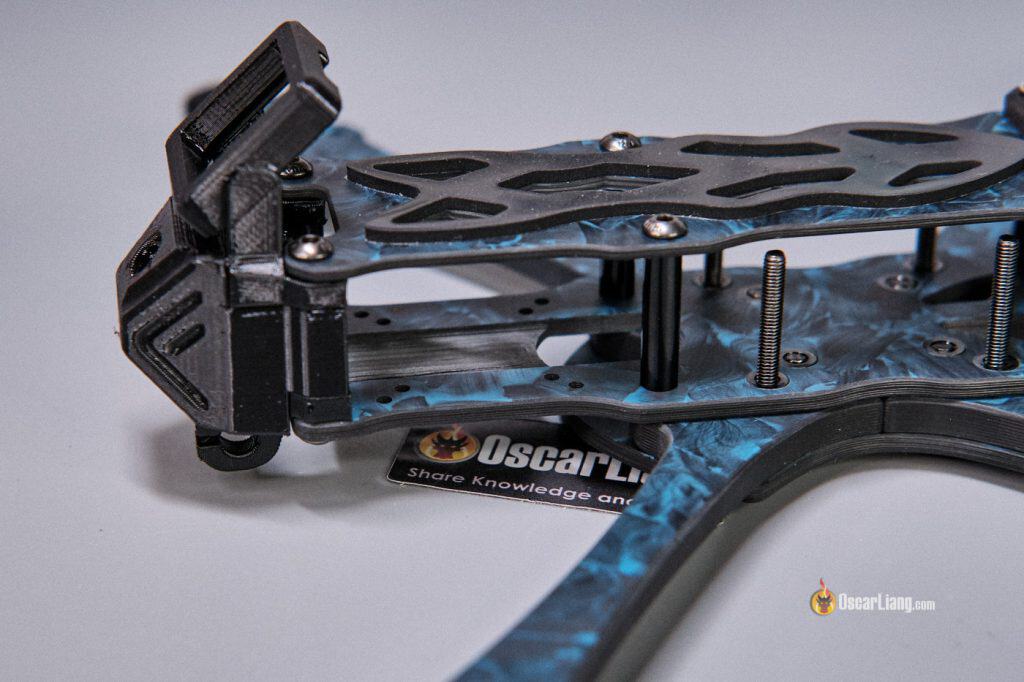

Arm Design and Rigidity
Each arm on the Manta is secured with three screws, making arm replacement quick and easy. The arms interlock, providing sufficient rigidity; however, the addition of an arm locking wedge (like the one on the Source One) could further enhance overall strength and rigidity.
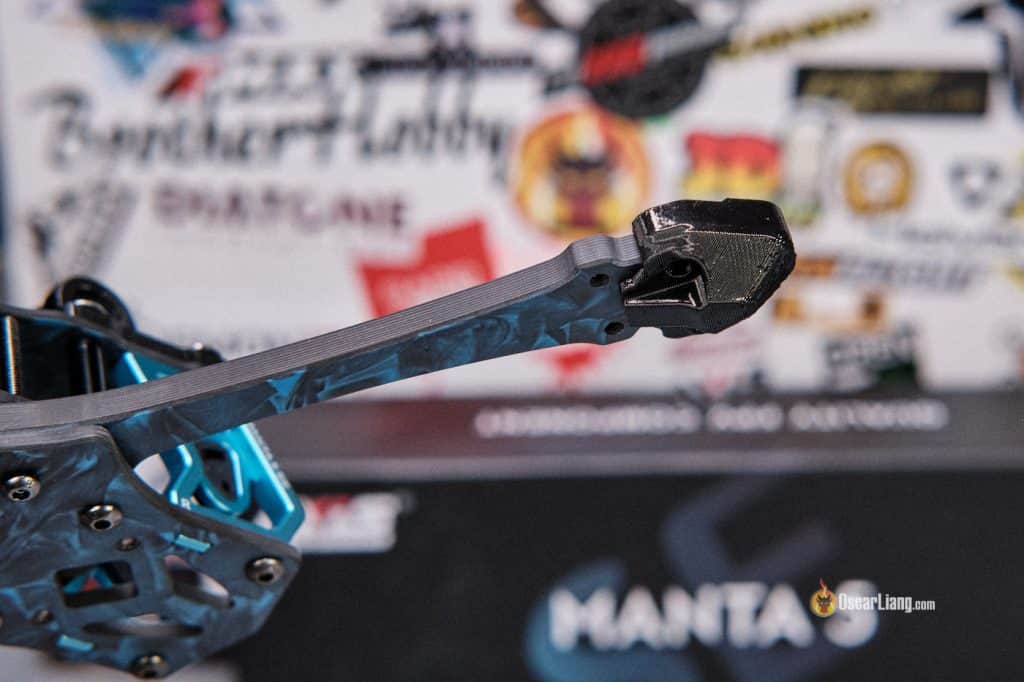
The frame supports motors with 16x16mm mounting holes, which are compatible with nearly all popular motors. It accommodates propellers up to 5.1 inches, offering flexibility for different power setups.
Durability and Weight
The top and bottom plates of the Manta are slightly wider than those of the Source One, providing extra protection for the electronics. While the arms on the Manta are 0.5mm thinner, they are also wider, which should balance out the durability.
When it comes to weight, the two frames are nearly identical. The Source One V5 weighs 128g, while the Manta 5 SE weighs 130g (excluding 3D-printed parts).
Here’s how the assembled Manta 5 SE looks without 3D-printed parts:
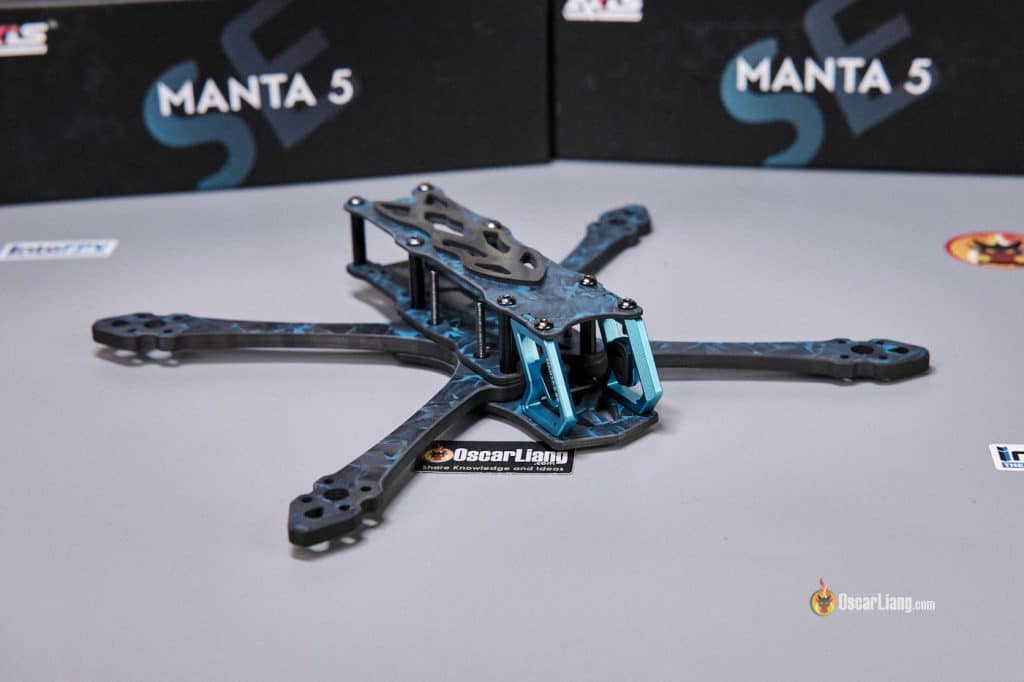
Here’s how it looks with 3D printed parts:

XT60 Pigtail Placement
A growing trend in FPV frame design is routing the XT60 pigtail through a hole in the middle of the top plate. This design minimizes the risk of the power wires being cut by propellers. However, the Manta 5 SE does not have a top plate cutout for this purpose, so the pigtail must exit from the rear.
How to Assemble
The Manta 5 SE frame kit uses various types of screws, which can be confusing at first. While there is an assembly manual included, it could benefit from additional diagrams to further clarify the assembly steps.
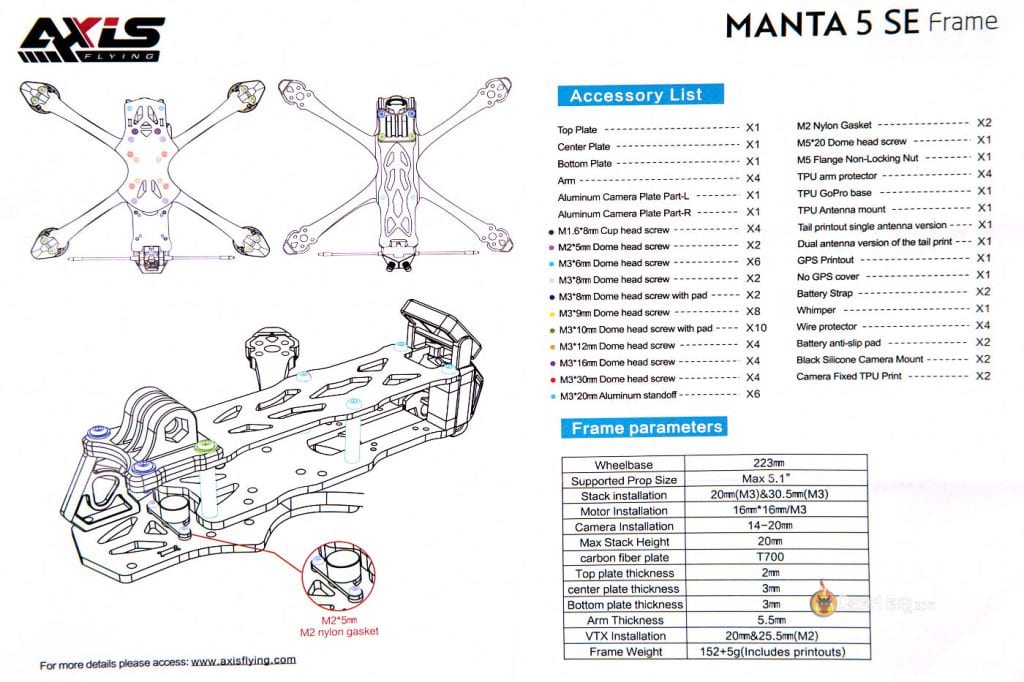
On the bright side, the manual color-codes the screws in the diagrams and matches them to the accessory list, making identification much easier. However, adding color labels to the actual screw bags would have made the process even more intuitive.
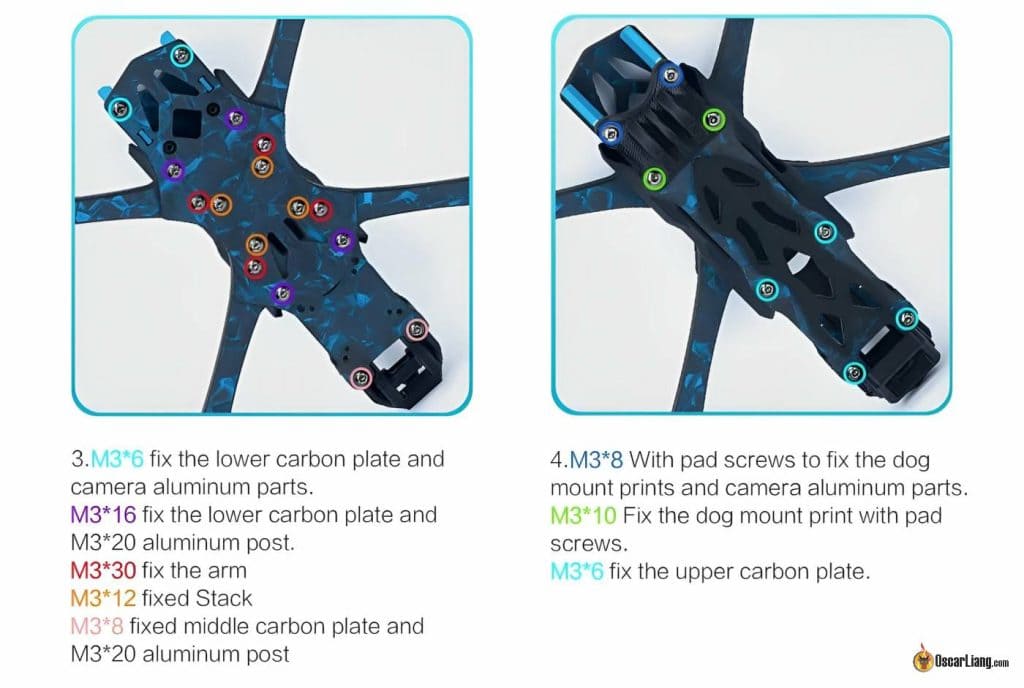
The tolerances for the carbon fiber and 3D-printed parts are just right—not overly tight, making assembly and repairs straightforward, while still maintaining the necessary stiffness for vibration-free performance. This is a testament to the excellent execution of the design.
Begin by installing the buzzer on the bottom plate.
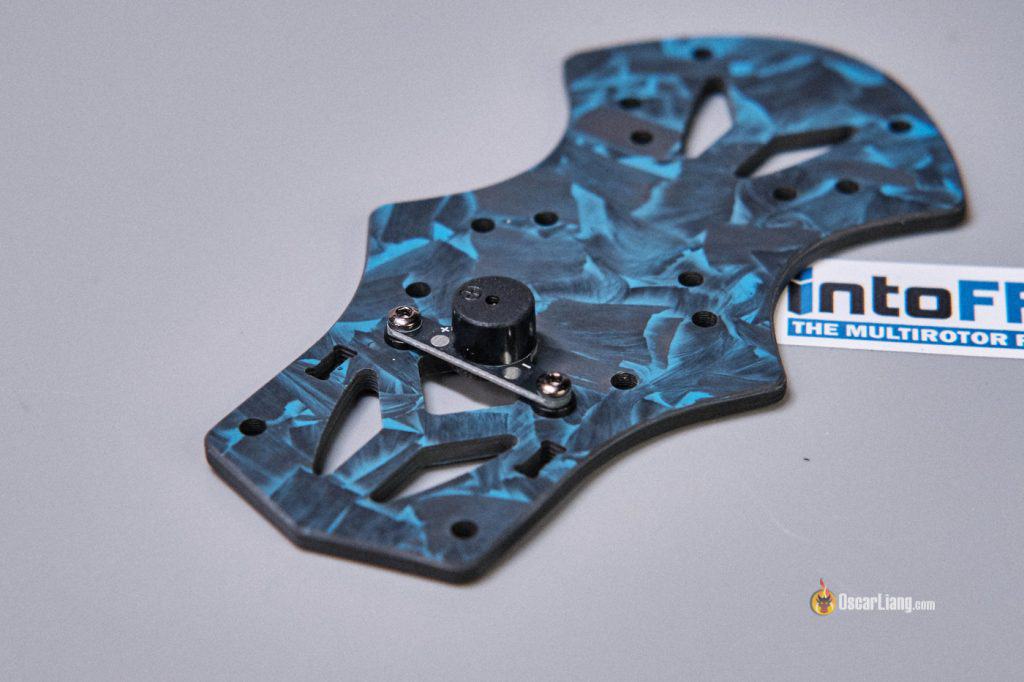
Figure out how you will install the arms.
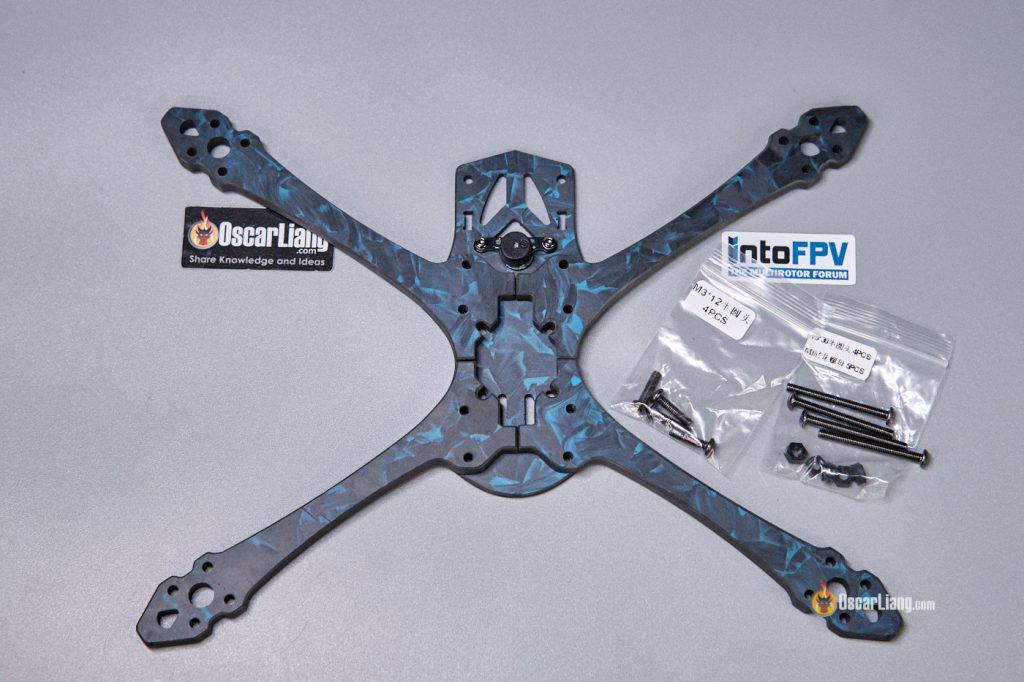
Secure the arms to between the two bottom plates.

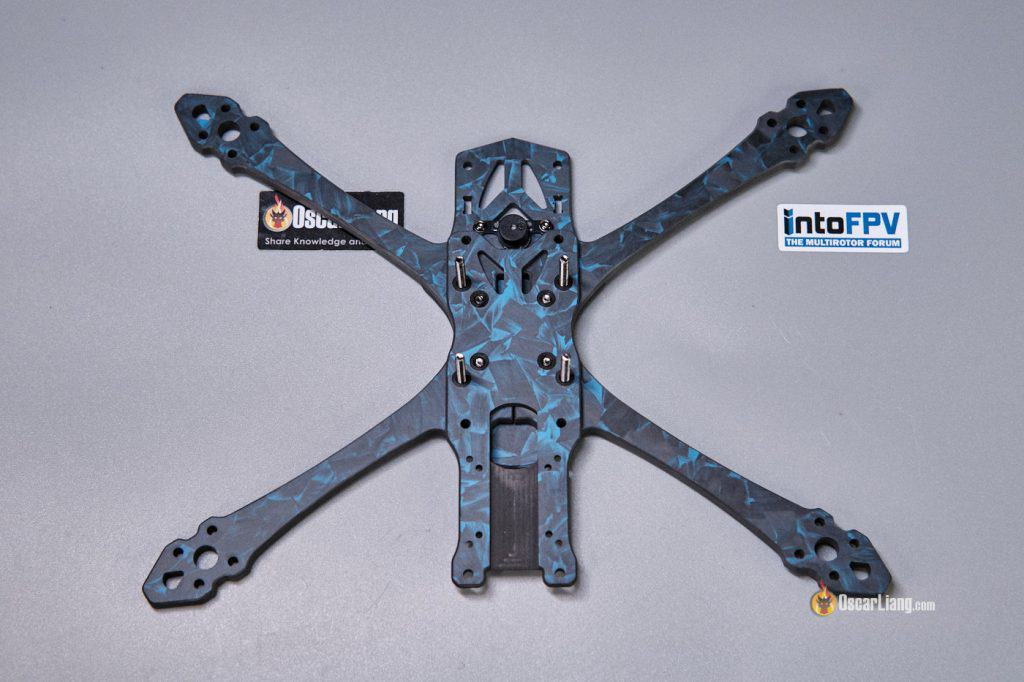
Install the CNC aluminuim camera side plates.
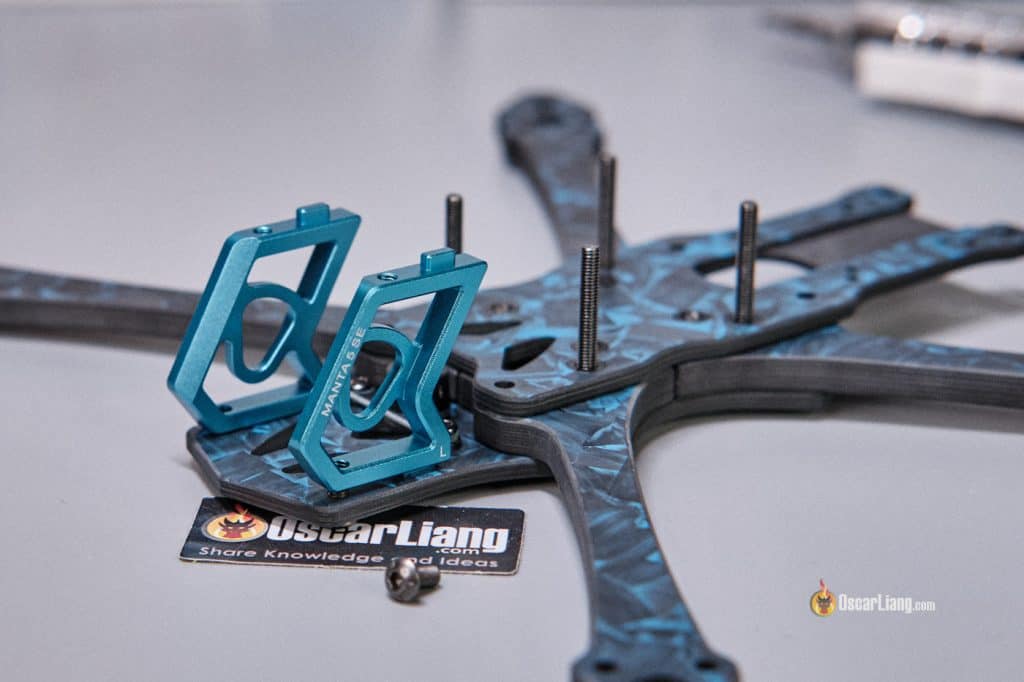
Attach the six standoffs to the bottom plate.
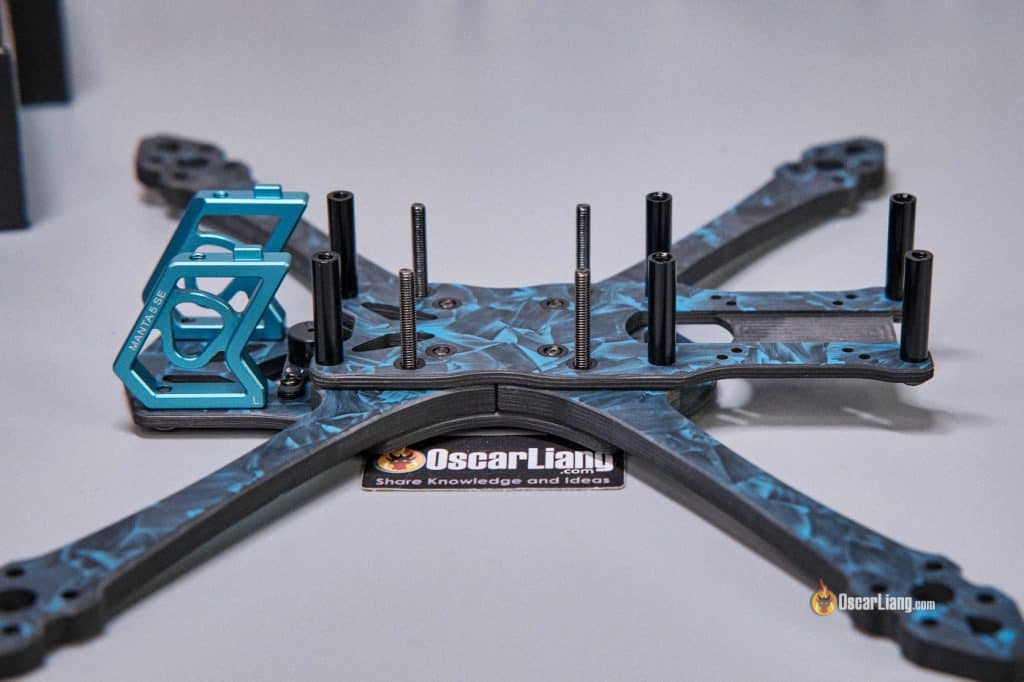
Here’s how the frame looks from the bottom:
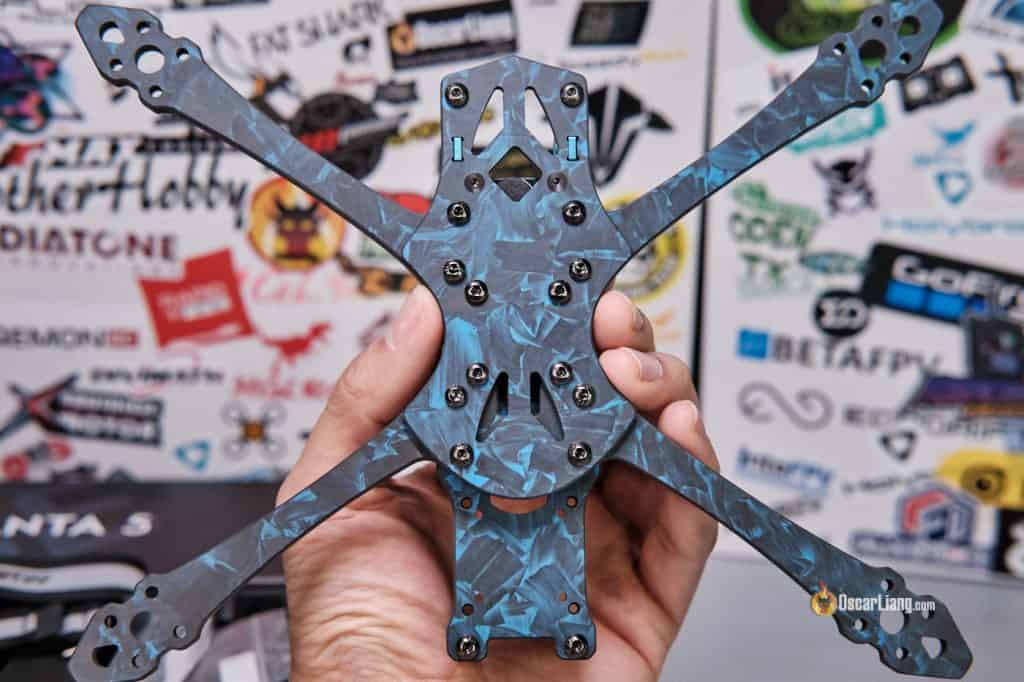
Stick the battery pad onto the top plate, then install the top plate to the frame.
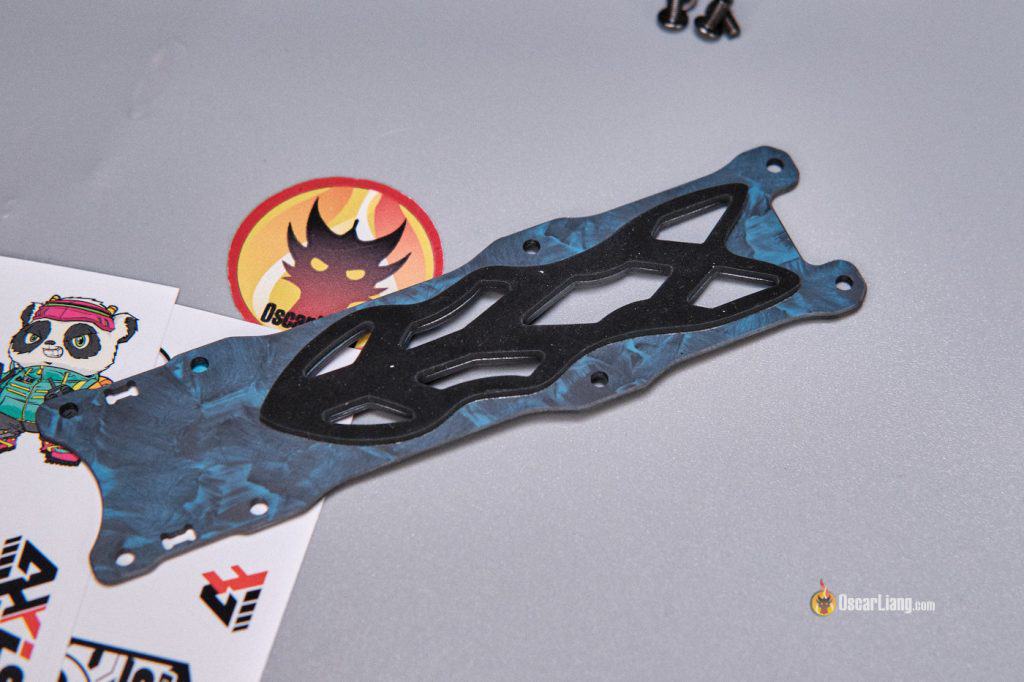
Finally, attach the 3D-printed accessories (e.g., GoPro mount, GPS holder, VTX/antenna mounts) as needed. Only install the accessories you require to keep the weight down.
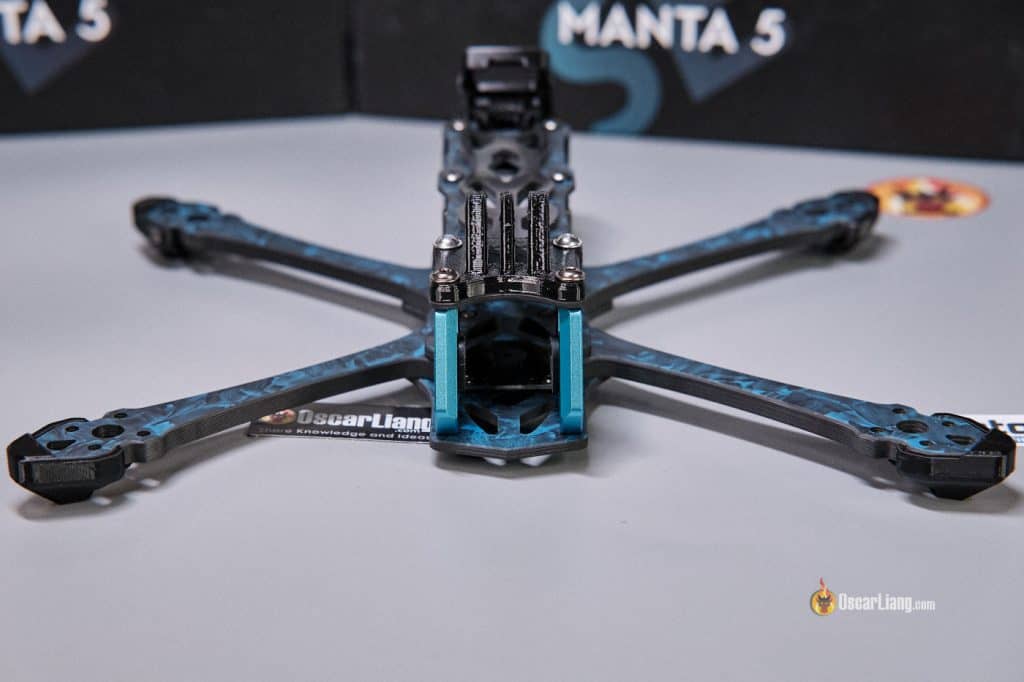
Here’s how the frame looks from above:
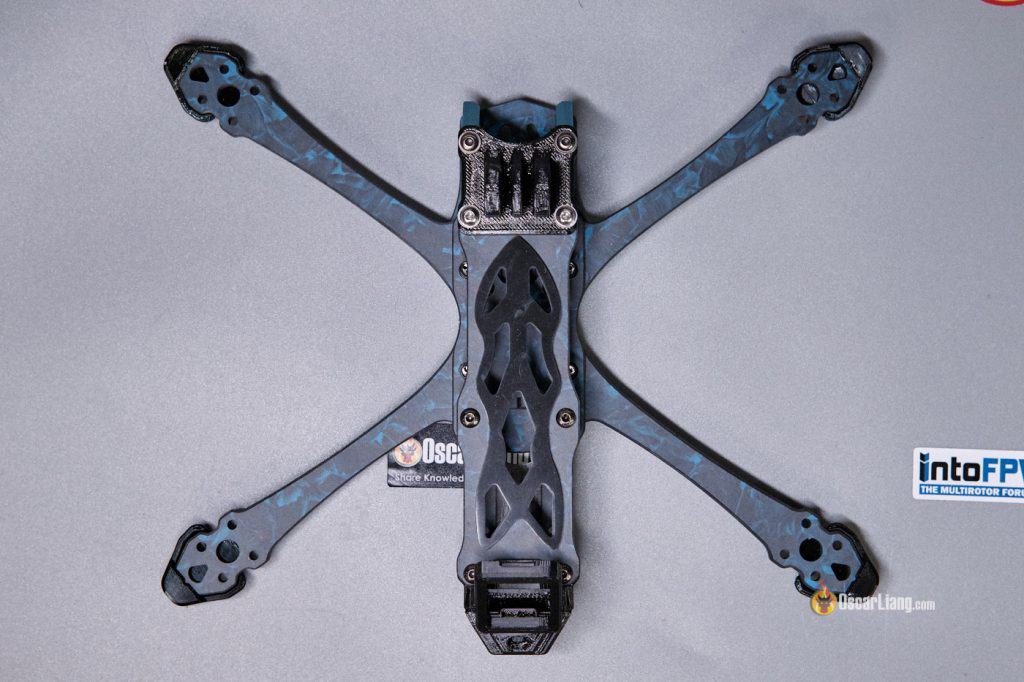
What Can Be Done Better
- Offer Spare Parts: Offer spare arms and top/bottom plates separately for repair without buying a whole kit again.
- Include Extra Screws: The frame comes with just the exact number of screws and no spares at all, so make sure you don’t lose them. Including extra screws would be a thoughtful addition.
- Improve Arm Rigidity: While the arms interlock well enough to avoid major rigidity issues, incorporating some sort of arm locking mechanism, like the arm locking wedge in the Source One, could further enhance strength and stiffness.
- Share TPU Mount Designs: Sharing the 3D-printable TPU mount designs would be a big help for builders who want to print replacements or modify them for their specific needs.
- Support Larger GPS Modules: The included GPS mount only supports 18x18mm modules. Adding a mount for 20x20mm or larger GPS units, which are also common, would increase flexibility.
- More Detailed Manual: While the frame includes a simple assembly leaflet, more detailed instructions with step-by-step diagrams would be invaluable, especially for beginners.
Conclusion
The AxisFlying Manta 5 SE frame kit is a no-brainer, especially for those who don’t own a 3D printer and need a ready-to-go 5inch FPV drone frame for freestyle, cinematic or long range. This frame combines features, ease of use, and aesthetic appeal, making it stand out as a premium freestyle option.
You can purchase the Manta 5 SE frame kit from these vendors:
Its Squashed X design provides excellent agility for freestyle flying while keeping props out of the camera’s view for clean HD footage. The use of CNC aluminum and T700 carbon fiber delivers impressive durability without compromising flight performance.
If your goal is to keep costs as low as possible and you have access to a 3D printer, the Source One remains a solid alternative. However, for those looking for a fully equipped, hassle-free frame, the Manta 5 SE is undoubtedly the best budget frame in 2025, perfect for both beginners and experienced pilots.
